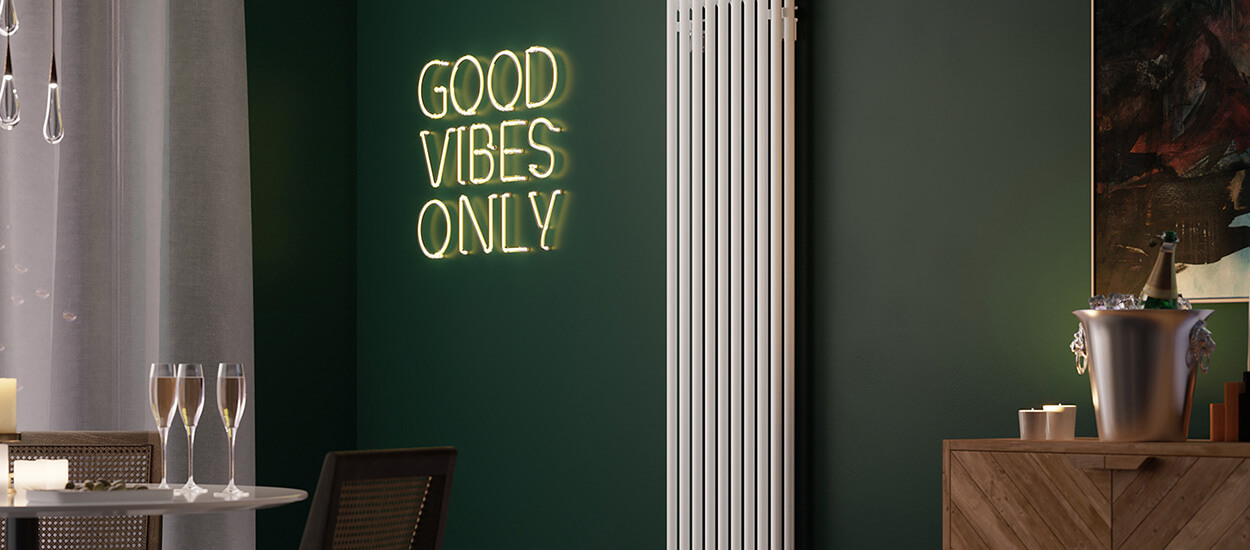During your search for your perfect radiator, you can easily get carried away with the ranges of designer radiators, heated towel radiators and vertical radiators. Most options of radiators come with single and double options for convectors in fins so it’s important to know what you’re looking for before purchasing your new radiators. Here, we’ll discuss single vs. double convector radiators, and which would be your ideal heating solution.
What Is a Convector Radiator & How Do They Work?
Convector radiators are quite simply your standard, run-of-the-mill radiator and are among the most common appliances used for heating homes in the UK. They are so popular due to their excellent efficiency and the speed at which they increase the heat of a room. Convector radiators usually comprise one or two panels of grooved steel and a number of convector fins that you’ll find down the back or in between the panels to help increase the surface area.
These types of radiators warm the surrounding air by circulating hot water through a tube that is surrounded by the fins. These fins conduct the heat from the central tube which then results in a larger surface area ad more contact with the surrounding air. Hot air rises from the radiator and cool air is drawn into the radiator from the sides which is a process known as convective heating.
Benefits of a Convector Radiator
There are many different benefits to having a convector radiator in your home. Due to the increased contact area and how they encourage airflow, convector radiators warm your rooms a lot quicker than traditional radiators. This means that throughout the winter months, you can save money by not needing to keep your radiators on for longer than needed when they quickly raise the temperature of your room.
Convector radiators are also able to achieve the same results as larger radiators in a much smaller unit which helps you to save on space in your home and open up a wide range of interior décor opportunities. Smaller convector radiators are therefore better for rooms where there may be a lack of wall space or floor space and are easier to conceal under windows. Convector radiators are sleek and stylish and provide a great feature to any room in your home whilst being an efficient and money-saving option.
Single Vs. Double Convector Radiators
When deciding between single vs. double convector radiators, this is determined by a number of different factors. Single radiators generally give out less heat than double radiators, however, are a great space-saving option if you have smaller rooms that don’t need much heat. Whereas double radiators are a great option for larger, more open spaces such as large living rooms or open plan floors.
Single Convector Radiators
Also known as Type 11 radiators, single panel convector radiators are ideal for heating smaller rooms quickly. They feature a single panel that is usually made from steel and have one set of convector fins attached to the back. These single convector radiators are available in a range of sizes and dimensions including vertical radiators for modern homes with narrow walls. Single convector radiators are commonly used in hallways, small bedrooms, bathrooms and ensuites.
Double Convector Radiators
Double panel double convector radiators, also known as Type 22 radiators, consist of two layers of convector fins that are sandwiched between two steel panels. The extra sets of fins increase the surface area of the radiator and help to maximise the output and generate sufficient heating for your room. This kind of radiator is better suited to medium and large-sized rooms that need more heating.
Another type of double convector radiator is the Type 21 radiator. This is one step up from Type 11 as it has another panel on the back enclosing a single set of convector fins. This type of radiator is a great way to add some extra warmth to your room. They are perfect for small to medium-sized bedrooms, hallways and dining rooms.
Choosing Single Vs. Double Convector Radiators
Because single convector radiators give out less heat than double, you may be wondering why someone would get a single convector radiator when you can get the double that kicks out more heat. However, choosing a single convector radiator is perfect for rooms that are short on space or are narrow spaces like in the hallway, as they don’t give out too much heat and aren’t too far from the wall so it’s difficult to move around.
Single convector radiators are also great for aesthetic purposes. As single convector radiators are wider than double, they can sit under the window seamlessly compared to the double convector radiator that is half the size with the same heat output. Your choice of single vs. double convector radiators is also down to personal preference with looks and heat preference.
Double convector radiators emit more heat in a quicker time than single convector radiators. This means they are more well suited for larger rooms and larger homes that require the additional heat and efficiency and have the added wall space for larger radiators.
When it comes to the single vs. double convector radiators argument, it all comes down to a few different factors, such as the type of windows you have, where you intend on placing your radiator, and what is above and below the room. If you have a large, spacious area, the double convector panels may be your perfect choice as they generate heat more quickly and efficiently. However, if you have a smaller room without much space, then a single convector radiator may be all you need so that you aren’t spending more on unnecessary heating bills. To ensure you get your calculations right, use a BTU calculator and get an accurate figure to help you in your search for the perfect heating solution for your home.

